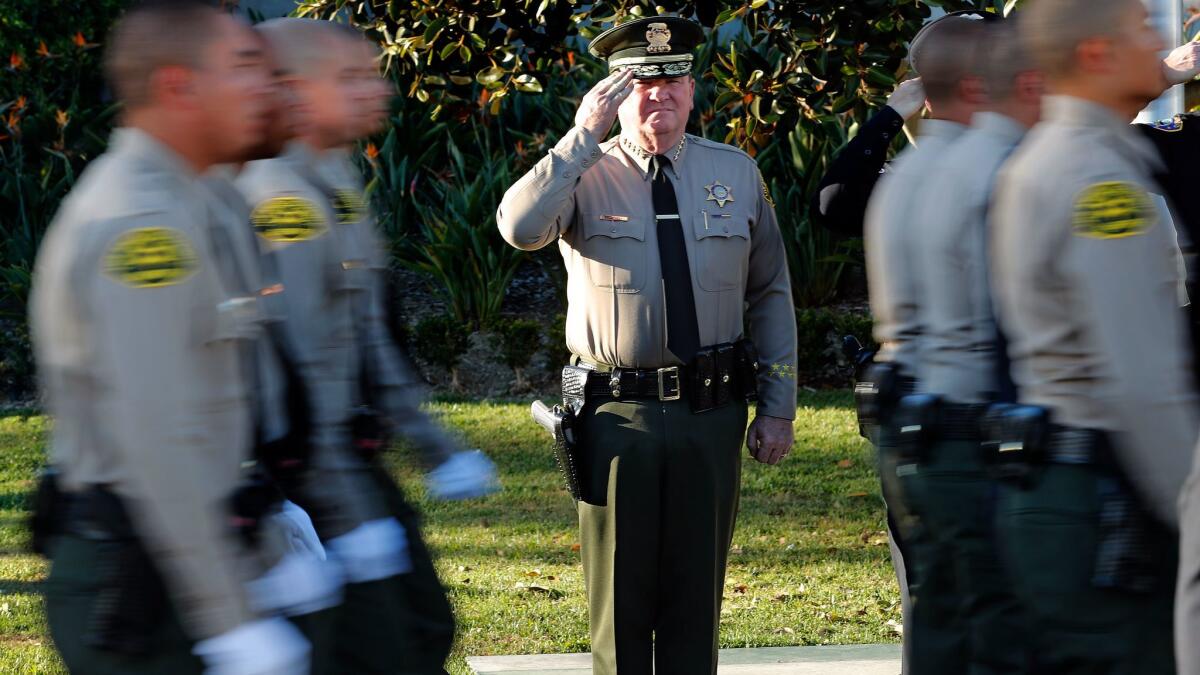Sheriff McDonnell was not aware of some misconduct, says list of problem deputies is key to reform

Los Angeles County Sheriff Jim McDonnell learned for the first time about misconduct by some of his own deputies from a Times report this month that examined a confidential roster of problem officers, he said.
McDonnell tried to give prosecutors a version of the so-called “Brady list,” but his efforts were blocked when a deputies’ union sued him last year. The case is now before the California Supreme Court.
The sheriff said he feels strongly that prosecutors should have this information as they assess how to use his deputies in criminal trials. But as the leader of an agency with 18,000 employees, he said he does not always know about every allegation of wrongdoing in his agency.
Among the cases he said he learned about from the Los Angeles Times story was that of Sheriff’s Sgt. Jose Ovalle. After Ovalle realized a bloodied inmate’s shirt from a jail brawl was missing, he created false evidence by pouring taco sauce on a shirt, law enforcement records show. Ovalle’s name was added to a secret list of about 300 deputies whose history of wrongdoing might affect their credibility if they testify in court, according to a version of the list from 2014 that was reviewed by The Times.
“I certainly felt the same way that any reader would: ‘How does this happen? How do we end up in a position where we’re dealing with issues like this and reading about it in the paper?’” McDonnell said recently of the revelations in the Times article.
McDonnell said his effort to give the Brady list to prosecutors is part of reforming and “restoring credibility” to a department that was disgraced by a jail abuse scandal that resulted in the criminal conviction of more than 20 agency officials, including former Sheriff Lee Baca.
McDonnell became sheriff in 2014 and inherited many of the so-called “Brady deputies,” who had been disciplined long ago for lying, falsifying reports, committing domestic violence, and other violations. He’s barred by law from firing officers who were punished years earlier for their misconduct. And deputies can be reinstated or have their suspensions reduced by a county appeals board.
The sheriff, who was elected after the scandal that led to federal charges against Baca and other top officials, has clamped down on dishonesty and fought in court to make sure some misbehaving officers don’t win their jobs back.
But when it comes to deputies whose wrongdoing occurred before his time, McDonnell says he has to “play with the team” and give those officers a shot at rehabilitation.
“It’s reality,” he says. “In some of those cases, those people were terminated and ordered back by the court. So you now have that person in the organization, and you have to get the best performance out of them you can. You’re paying them. They may be here for two more decades. To leave them without the hope of redeeming themselves is not productive.”
Ovalle was able to keep his job after the taco sauce incident in 2003 and “performed an act of exceptional heroism” by saving a woman from a burning car the following year, according to county records. Ovalle, who now serves at the Century Station, said recently that he did not want to comment.
McDonnell has said that giving prosecutors the Brady list — named for a landmark 1963 U.S. Supreme Court decision that requires prosecutors to tell defendants about favorable evidence, including information that could damage the credibility of government witnesses — would help preserve the integrity of cases that rely on his deputies’ testimony.
The Assn. for Los Angeles Deputy Sheriffs, which represents rank-and-file deputies, says the Brady list casts a shadow upon deputies who have already been punished for infractions that were in some cases minor and long in the past. The union’s president, Det. Ron Hernandez, did not respond to a request for comment.
Some watchdogs said the newspaper’s disclosures raised questions about why some deputies with histories of misconduct have kept their jobs.
“An important question ... is whether the disciplinary system is working or whether it is broken,” said Robert Bonner, a former federal judge and DEA administrator who chairs the Sheriff Civilian Oversight Commission.
Sean Kennedy, who also serves on the commission and is the executive director of Loyola Law School’s Center for Juvenile Law and Policy, said current deputies who committed misconduct many years ago could still pose problems as witnesses.
“It was startling that someone could create fake blood evidence with taco sauce, even if that’s in the distant past,” he said. “Someone who is willing to convict someone using false evidence and went through that level of artifice and creativity to create false physical evidence, in my opinion, remains of great concern.”
Twitter: @mayalau
More to Read
Sign up for Essential California
The most important California stories and recommendations in your inbox every morning.
You may occasionally receive promotional content from the Los Angeles Times.










